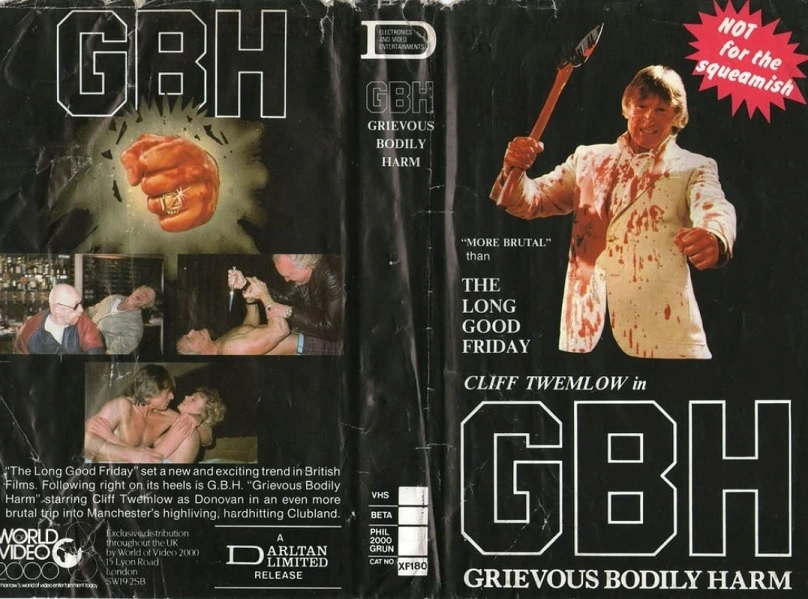
Cliff Twemlow’s life, even if you happen to be as-yet unfamiliar with him, is definitely a life worth examining. Even if you haven’t yet availed yourself of any of his films (and I hadn’t until comparatively recently) then Mancunian Man will almost certainly grant you curiosity about his acting career. But, there’s a lot more going on here too: it’s a story of huge highs and lows, or “boom and bust”, as it’s described during the documentary. These highs and lows happen to be linked to the film industry in this particular case, but it’s as much a story about what could happen and what occasionally did happen between the end of WWII through to the permissive Seventies and opportunistic 80s, as mapped out by the post-war generation who took full advantage of the possibilities opening up to them. This is a snapshot of interesting, innovative and industrious people working together during an extraordinary time.
Mancunian Man moves in a linear fashion, starting with Twemlow’s lowly Manchester roots, where he was born just prior to WWII (but always claiming to be just a touch younger). We find out about his family’s vaudeville links, and that he was an evacuee during the War, sent out of Manchester to Glossop in Derbyshire, something which proved to be a traumatic formative experience for Cliff. On returning home, as he grew up, he evinced an interest in boxing and the new kind of ‘body beautiful’ aesthetics most famously being sold by Charles Atlas; Twemlow’s appetite for physical training stayed with him throughout his life, for good and ill. Alongside, he undertook a wide range of jobs, some of which began to touch upon the arts: he did some extras work, and Twemlow had a music career prior to getting into films in a fuller sense.
Twemlow’s music career also hints at the pattern of rags-to-riches-to-rags which would trouble him throughout his working life. However, he was successful enough to make a name for himself (one of his songs features on the Dawn of the Dead OST) and this helped him gain a tentative foothold in acting – acting which was very firmly rooted locally, and overlapped with Twemlow’s occasional but longstanding work as a nightclub bouncer. Manchester was, at the time, a bustling centre for nightlife in the North (i.e. in the not-London bit of the country) with plenty of prestigious clubs and available work. They say ‘write about what you know’; Cliff, a formidable personality, did so, and his story Tuxedo Warrior was optioned before he got his own acting career off the blocks (albeit that some baffling changes were made to his original story).
It was probably the rise of video around this time which really proved invaluable to Twemlow; one of the reasons the authorities panicked and overreacted to VHS was largely down to the sudden new prospects and possibilities it offered to people who weren’t always, let us say, operating from within the old trammels of established practice. It really was the Wild West. Fittingly, one of Twemlow’s early starring roles, G.B.H. (1983), was swept up in the ‘video nasties’ debacle; it was one of the strange outliers, one of the non-horror films which nonetheless had a lot of violence in it, and was deemed harmful. Still, the real focus of this section of the documentary is really its focus on the spontaneity and devil-may-care attitude which prevailed at this time (and which feels lost, or ten times more difficult now).
Again, there were ups and downs here: sometimes projects went great, sometimes they were dangerous, expensive and profoundly ill-advised. This section of the film does feel most like it’s for the enjoyment of the team/s involved, as the level of anecdotal detail does start to slow proceedings down a little here. That said, glimpses at improvised projects, unfinished projects and this great variety of ideas do provide entertainment. I couldn’t help but wonder if your friend and mine, Polish exploitation director Patryk Vega, hasn’t at some point watched Twemlow’s films and drawn inspiration from them; I really bloody hope he has; it would feel very fitting. Twemlow certainly didn’t decide to stick to just one genre, either, with a few forays into horror and sci-fi for good measure, even if that meant the additional outlay for make-up SFX and animatronics. The guy didn’t think small.
Happily, the film doesn’t linger unduly on Twemlow’s eventual decline; it doesn’t ignore it, either, but it’s not the focus, and for good reason. This is Twemlow’s film, but it’s clearly not intended as any kind of narrow eulogy. By the end of the film, this is a love letter to exploitation cinema as much as it is a personal tribute to Cliff Twemlow, and that seems perfectly appropriate. There’s a great range of interviewees, from Cliff’s own family and friends, collaborators, authors and co-actors. We also get a lot of visual variety and depth, with a grand array of footage from TV, cinema and music, and impeccable editing which makes every snippet of conversation and every addition of footage flow together seamlessly; director Jake West has the knack of making his documentary work look effortless, when clearly collating all of this material together and making it into a coherent whole is anything but. This is an engaging look at a larger-than-life figure who, as several of his old friends pointed out, would really have enjoyed all of this, but in lieu of that, if this affectionate, informative documentary encourages more people to check out Twemlow’s films and/or to delve into this record of a unique point in time, then that can be no bad thing.
Mancunian Man: the Legendary Life of Cliff Twemlow (2023) will receive its Manchester Premiere on 12th November 2023 at Cultplex.
